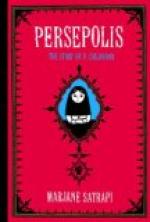“Loving she is, and tractable,
though wild;
And Innocence hath privilege
in her,
To dignify arch looks and
laughing eyes
And feats of cunning, and
the pretty round
Of trespasses, affected to
provoke
Mock chastisement and partnership
in play.
And, as a fagot sparkles on
the hearth
Not less if unattended and
alone
Than when both young and old
sit gathered round
And take delight in its activity,
Even so this happy creature
of herself
Is all-sufficient; solitude
to her
Is blithe society: she
fills the air
With gladness and involuntary
songs.”
But we will let her disclose herself. We need hardly say that all this is true, and that these letters are as really Marjorie’s as was this light brown hair; indeed, you could as easily fabricate the one as the other.
There was an old servant—Jeanie Robertson—who was forty years in her grandfather’s family. Marjorie Fleming, or, as she is called in the letters and by Sir Walter, Maidie, was the last child she kept. Jeanie’s wages never exceeded 3 pounds a year, and when she left service she had saved 40 pounds. She was devotedly attached to Maidie, rather despising and ill-using her sister Isabella,—a beautiful and gentle child. This partiality made Maidie apt at times to domineer over Isabella. “I mention this,” writes her surviving sister, “for the purpose of telling you an instance of Maidie’s generous justice. When only five years old, when walking in Raith grounds, the two children had run on before, and old Jeanie remembered they might come too near a dangerous mill-lade. She called to them to turn back. Maidie heeded her not, rushed all the faster on, and fell, and would have been lost, had her sister not pulled her back, saving her life, but tearing her clothes. Jeanie flew on Isabella to ‘give it her’ for spoiling her favorite’s dress; Maidie rushed in between, crying out, ’Pay (whip) Maidjie as much as you like, and I’ll not say one word; but touch Isy, and I’ll roar like a bull!’ Years after Maidie was resting in her grave, my mother used to take me to the place, and told the story always in the exact same words.” This Jeanie must have been a character. She took great pride in exhibiting Maidie’s brother William’s Calvinistic acquirements when nineteen months old, to the officers of a militia regiment then quartered in Kirkcaldy. This performance was so amusing that it was often repeated, and the little theologian was presented by them with a cap and feathers. Jeanie’s glory was “putting him through the carritch” (catechism) in broad Scotch, beginning at the beginning with “Wha made ye, ma bonnie man?” For the correctness of this and the three next replies, Jeanie had no anxiety, but the tone changed to menace, and the closed nieve (fist) was shaken in the child’s face as she demanded, “Of what are you made?” “DIRT,” was the answer uniformly given. “Wull ye never learn to say dust, ye thrawn deevil?” with a cuff from the opened hand, was the as inevitable rejoinder.




